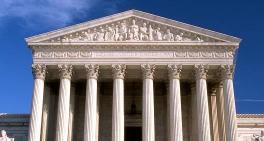Supreme Court says cities can sue banks under anti-bias law
U.S. Supreme Court
The Supreme Court ruled Monday that cities may sue banks under the federal anti-discrimination in housing law, but said those lawsuits must tie claims about predatory lending practices among minority customers directly to declines in property taxes.
The justices' 5-3 ruling partly validated a novel approach by Miami and other cities to try to hold banks accountable under the federal Fair Housing Act for the wave of foreclosures during the housing crisis a decade ago.
But the court still threw out an appellate ruling in Miami's favor and ordered a lower court to re-examine the city's lawsuit against Wells Fargo and Bank of America to be sure that there is a direct connection between the lending practices and the city's losses.
Miami claimed that Wells Fargo and Bank of America, as well as Citigroup, pursued a decade-long pattern of targeting African-American and Hispanic borrowers for costlier and riskier loans than those offered to white customers. The loans to minority homeowners went into default more quickly as well, the city said.
Wells Fargo and Bank of America appealed the ruling by the 11th U.S. Circuit Court of Appeals to the Supreme Court, arguing that cities can't use the Fair Housing Act to sue over reductions in tax revenues. The banks said the connection between a loan and the tax consequences is too tenuous. Citigroup did not appeal, though its lawsuit also would be affected by what the appeals court does in response to Monday's ruling.
Related listings
-
High court limits seizure of assets from drug conspiracies
U.S. Supreme Court 08/03/2017The Supreme Court is limiting the government's ability to seize assets from people who are convicted of drug crimes but receive little of the illegal proceeds.The justices ruled Monday that a Tennessee man convicted for his role selling iodine water ...
-
Trump admin asks Supreme Court to restore travel ban
U.S. Supreme Court 07/30/2017The Trump administration has asked the Supreme Court to restore the ban on travel to the U.S. from citizens of six Muslim-majority countries.Per Reuters: "The administration filed two emergency applications with the nine Court justices seeking to blo...
-
Supreme Court Justice Neil Gorsuch: Rule of law 'a blessing'
U.S. Supreme Court 07/23/2017Supreme Court Justice Neil Gorsuch acknowledged Friday that there is "a lot of skepticism about the rule of law" in the country but defended the United States judicial system as "a blessing" and "a remarkable gift" during a talk at Harvard University...

USCIS to Begin Accepting Applications under the International Entrepreneur Rule
U.S. Citizenship and Immigration Services (USCIS) announced today it is taking steps to implement the International Entrepreneur Rule (IER), in accordance with a recent court decision.
Although the IER was published during the previous administration with an effective date of July 17, 2017, it did not take effect because the Department of Homeland Security (DHS) issued a final rule on July 11, 2017, delaying the IER’s effective date until March 14, 2018. This delay rule was meant to give USCIS time to review the IER and, if necessary, to issue a rule proposing to remove the IER program regulations.
However, a Dec. 1, 2017, ruling from the U.S. District Court for the District of Columbia in National Venture Capital Association v. Duke vacated USCIS’ final rule to delay the effective date. The Dec. 1, 2017, court decision is a result of litigation filed in district court on Sept. 19, 2017, which challenged the delay rule.




